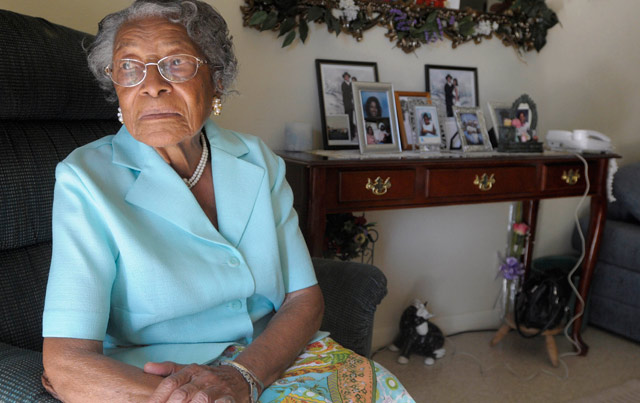
Recy Taylor, 91, in her home in Winter Haven, Fla., in October 2010. AP Photo/Phelan M. Ebenhack, File
Yesterday, Abbeville city and Alabama state officials held a press conference at the Henry County Courthouse to express their sympathy for Recy Taylor, 91, a former Abbeville resident who was gang raped there by seven white men in 1944. But the officials made clear the apologies were personal rather than on behalf of the city or state. That leaves Taylor and her family still awaiting some modicum of justice for an assault that, then and now, has become a symbol for untold numbers of rapes southern black women suffered throughout the Jim Crow era.
Last week, I reported for Colorlines on a building effort, led by Taylor’s family, to win an apology for the failure to meaningfully investigate and prosecute her assailants.
Local TV station WTVY reports on Monday’s press conference:
Public officials are now giving the victim and her family personal apologies for the events of that era.
“I open my heart up and say that I am deeply sorry for what happened,” says AL Representative Dexter Grimsley.
“Anytime one of our residents whether past or present feels pain or feels victimized we certainly want to offer that apology,” says Abbeville Mayor Ryan Blalock.
Following the press conference, Taylor’s brother Robert Corbitt told me by phone, “While I’m pleased with the mayor’s apology, it’s nothing official. We were looking for an official one from the city, the state and the county.”
“I did hear the representative say he was gonna get a resolution in to the state,” Corbitt said, “but I never heard the mayor say that he was going to present it to the city council. He just said it must come from the city council. He never said anything about when he was gonna do it.”
State and city governments are often reluctant to issue official apologies for past injustices for fear that it will leave them vulnerable to civil suits.
Rep. Grimsley reaffirmed Monday his intent to introduce a House resolution calling for a state apology to Recy Taylor “before the session is out.” The current legislative session started March 1 and goes about another six weeks, Grimsley said.
Recent overtures by city and state government officials towards Recy Taylor and her family follow mounting public interest in Taylor’s case, starting with the September 2010 publication of Danielle McGuire’s book, “At the Dark End of the Street: Black Women, Rape, and Resistance,” which tells Taylor’s story.
Recy Taylor and Robert Corbitt first publicly conveyed their wishes for city and state apologies in a Feb. 9 article about Taylor by Cynthia Gordy in The Root. On Feb. 16, after reading Gordy’s article, Change.org editor Alex DiBranco launched a petition asking Alabama government officials for city and state apologies to Taylor. Corbitt has since put the petition under his name.
After 12 days, the Change.org petition gathered 1,000 signatures. When Colorlines broke the news on March 16 that Grimsley is planning to introduce a resolution for a state apology, the petition was up to 2,100 signatures. Signatures more than doubled in the first 24 hours after the Colorlines article and additional coverage by the AP and the Root. At this writing, the petition has more than 7,100 signatures.
Grimsley has told the AP that he became interested in Taylor’s case partly because of the Change.org petition.
(Cross-posted at Colorlines.)







